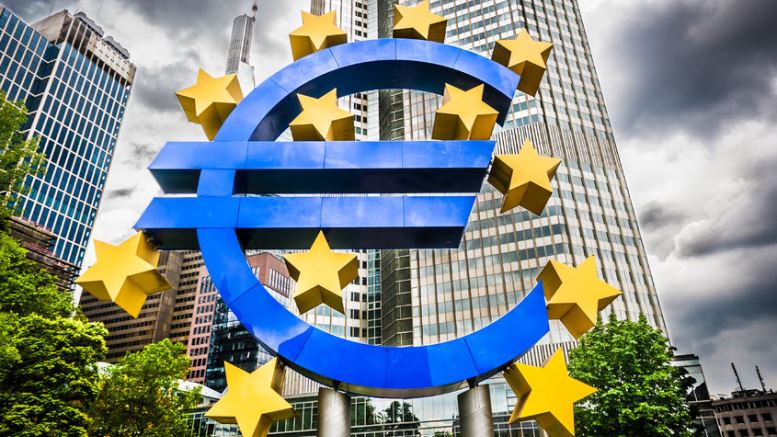By John Ryan
 At the moment, the European Central Bank (ECB) is both politicised and free from external political control. In principle, it is hard to see how this is sustainable over the long term. But it is equally hard to see how things can change, given Germany’s principled attachment to central bank independence, and its entirely practical attraction to an arrangement under which the EU’s more troublesome states will be disciplined without Germany getting all the blame.
At the moment, the European Central Bank (ECB) is both politicised and free from external political control. In principle, it is hard to see how this is sustainable over the long term. But it is equally hard to see how things can change, given Germany’s principled attachment to central bank independence, and its entirely practical attraction to an arrangement under which the EU’s more troublesome states will be disciplined without Germany getting all the blame.
If the history of Europe is any guide, then such apparently irrational arrangements can persist for a very long time indeed. What it means is more of the same sub optimal performance that has plagued Europe since the Eurozone crisis began, including persistent high unemployment and financial instability. The Eurozone will endure, but it will not prosper.
European Monetary Union (EMU) has been a considerable achievement. Yet it also remains fragile because of a flaw in its governance. This flaw is linked to the fact that there is no European government with the power to tax and spend independently from national governments, which means there cannot be even limited integration of government budgets and political oversight.
If mutualisation of at least a part of member states’ debt (sharing the responsibility for that debt across the Eurozone) was to happen, the Eurozone would take a big stride towards a large, integrated, and liquid (busy and stable) bond or debt market. This would make the European bond market more like that of the United States, which makes the dollar such an attractive currency. It would partly address the complaint that the euro is a currency without a state and so by definition lacks the independent fiscal capacity that is a fundamental characteristic of a reserve currency. So far, Germany has downplayed the grand plan of French President Emmanuel Macron for Eurozone reform, refusing to concede any substantive step towards fiscal union or a federal EU crisis machinery.
In 2015 Mario Draghi, the head of the ECB, decided to extend European Quantitative Easing (creating new money to buy financial assets, including bonds – known as Euro-QE) until March 2017. Then he extended Euro-QE to December 2017, with a promise to do more if necessary. When 2017 arrived there was talk of tapering, or reducing the programme. But in October 2017, the ECB announced that starting in January 2018 it would make monthly purchases of €30 billion until the end of September 2018, “or beyond, if necessary.” The ECB will halve its monthly purchases of bonds to €15 billion between October and December and stop them at the end of 2018, and sees no prospect of an increase in the ECB’s key lending rate – currently 0.0% – until the summer 2019 at the earliest. But what would that mean for the countries, companies, and banks that have grown to depend so much on the ECB?
It is, however, not just the vast power with which the ECB holds sway over Europe’s economies that is cause for mounting concern, it is the complete lack of transparency and accountability with which it wields that power. The ECB is far more independent than the US Federal Reserve, whose legal status is far weaker and which is directly accountable to Congress and the US government. The ECB was supposed to be like the German central bank, the Bundesbank. It has, however, failed to emulate the distinctive attributes that made the Bundesbank successful, such as accountability and interdependence with other democratic institutions.
The Maastricht Treaty, which defines the role of the ECB, says that the ECB has a primary mandate to maintain stable prices. It also says that, “where it is possible without compromising the mandate to maintain price stability”, the ECB will also support the “general economic policy of the EU”. This includes, among others, “steady, non-inflationary and environmentally friendly growth’” and “a high level of employment”. However, the emphasis is explicitly on price stability. The ECB can therefore justly claim to have held together a poorly designed system in difficult circumstances. But its mission creep is its own responsibility.
Not only is the ECB shielded from politicians, ECB statutes have also placed it beyond the reach of democratic rules on bad behaviour. The ultimate control politicians have over a central bank is the power to change its rules or statutes and the power to appoint governors. For example, in the case of Germany, a simple majority in the Bundestag could change Bundesbank law. This procedure is absent in the Eurozone. The statutes of the ECB can only be changed by revising the Maastricht Treaty, which requires unanimity of all member states – an unachievable political goal.
The ECB today argues that the only institution that has the right to limit its power is the European Court of Justice. But the court itself is not controlled directly by elected politicians, and it is consistently displaying an activist ‘Europhile’ interpretation of European treaties.
The Eurozone crisis has given the ECB governing council such an increase of power that no national government or national institution can match it. The Governing Council can at any time, with a majority vote, decide the fate of at least half a dozen governments, supporting them or bringing them down – and that number is increasing.
The ECB’s buying of sovereign and corporate bonds has spawned a mass culture of financial dependence across Europe, while merely serving to paper over the cracks that began forming in some Eurozone economies during the sovereign debt crisis. In many places the cracks are even bigger now than they were back then. This is the elephant in the ECB’s room, and by now it is too big to ignore.
The Euro, although ‘a currency without a state’, is backed by significant political and even state-like commitments. That the Euro must be saved at all costs is a core belief of both technocrats such as Draghi and politicians such as German chancellor Angela Merkel. Political elites, particularly in Germany, have staked their legacy on its success.
But there is a growing mismatch between the monetary and fiscal sides of the Eurozone governance system and this has led to a number of problems. The main problem is that, while we may not find it easy to live with the ECB, we cannot live without it. Yet, when we look at the Greek bailout programmes, it is easy to conclude that they have failed. The troika has imposed austerity, which has led to a severe contraction of output and highly adverse welfare effects. This was intended, in a way, to punish Greece for its perceived profligacy rather than serve as a way out of the crisis.
With almost prophetic insight German economist and former president of the Bundesbank Karl Otto Pöhl wrote in 1988: “In a monetary union with irreversibly fixed exchange rates the weak would become ever weaker and the strong ever stronger. We would thus experience great tensions in the real economy of Europe … In order to create a European currency, the governments and parliaments of Europe would have to be prepared to transfer sovereign rights to a supranational institution.”
In the early stages of the crisis, the ECB exercised its influence through secret letters to troubled member states such as Ireland and Italy, laying down conditions and implicitly threatening to withdraw support if they were not met. Now, the bank exercises its power directly and in public.
In November 2010, in a letter to the Irish Finance Minister, the ECB threatened to cut off liquidity support for Irish banks unless the government agreed to a financial assistance programme with the EU and the IMF (known as the ‘troika’, or set of three). The letter also made demands for fiscal austerity and structural reform that were not only beyond the ECB’s remit but were also wrong for Ireland’s circumstances. (In 2013 the ECB, now under Draghi’s leadership, similarly sought to impose a troika programme on Cyprus.)
It is unclear whether the ECB’s role in designing and monitoring conditions on spending and structural reforms for financial assistance packages is consistent with its legal mandate.
The history of ECB involvement in Ireland and Greece during the Eurozone crisis showed that as long as its ‘lender of last resort’ role remains as confused as it currently is, questions about whether the ECB is acting beyond its legal mandate and becoming overly involved in political and economic policy will in turn provoke questions about its legitimacy and accountability.
The ECB’s irresponsible actions in this case call into question their respect for the IMF attempts to resolve Greece’s debt crisis in a sustainable way. The ECB may or may not have had good reasons to cut off Greece – depending on your point of view – but it is clear that such a move is political. A central bank that is supposed to be the lender of last resort and guardian of financial stability was taking a deliberate and calculated decision to damage the Greek banking system. There was reputational damage, with the ECB seen in some quarters as arrogant, unaccountable, and authoritarian.
Meanwhile, the European interest rate cycle is turning. The days of super-low interest rates are not quite over yet, but borrowing costs look set to start rising. The ECB will have to start preparing the way over the next 12 months. We need to remember that a zero base interest rate and a central bank pumping money into the economy through purchasing bonds is not the norm. In one country alone, the cracks are so large that they could end up fracturing the entire Eurozone project. That country is Italy.
The government of Italy is saddled with one of the biggest public debt mountains in the world. The ECB now holds €341 billion of Italian bonds, an amount that far exceeds the €246 billion increase in Italy’s gross national debt since the ECB’s purchase programme started in 2012. The Five Star Movement and the Northern League who recently agreed to form a government following the 2018 election, were – according to a draft version of their coalition agreement leaked on 15 May 2018 – considering asking the ECB to forgive €250 billion of the country’s debt. They denied the leak was accurate, but Italian government bond prices dipped sharply the following day in reaction. The new Italian government may face serious problems from the markets and the European Union. Italian bonds will begin to soar, driving up the costs of funding for the Italian government. This is a major problem for Italy whose economy is still 6% smaller than it was before the global financial crisis of 2008.
Italy’s new anti-establishment government gives the ECB some tough choices as it tries to tread a line between containing market turmoil and sticking to plans to end its crisisera monetary support. The Italian government indicated that they had worries about whether — and how — the ECB was affecting markets. “The spread has spiked: it would be useful to know how much debt the Bank of Italy and the ECB have bought compared to the norm?
Have purchases gone down?” At the same time, it was quick to reiterate its commitment to the Euro. Italian finance minister Giovanni Tria stated in an interview with Corriere della Sera: “The position of the government is clear and unanimous. There is no discussion about leaving the euro. The government is determined to prevent any emergence of market conditions that would lead to leaving the euro. It’s not just that we don’t want to leave it: we will act in such a way that conditions that could call into question our presence in the euro area don’t start to emerge.”
Tria was asked about Italy’s position with regards to France’s calls for common bank deposit insurance and a Eurozone investment budget and Germany’s calls for monitoring on member states by a European monetary fund and debt restructuring procedures: “We agree with what France proposes. We want to move forward on many aspects of euro area governance and the Banking Union. I just say that: as for the monitoring, the EU commission has done a very good job, I don’t see why we should create an overlap with the intervention of a European monetary fund. More in general, we are not going to accept measures which, albeit unintentionally, may cause financial instability. Let’s avoid unintended consequences. Let’s be careful to avoid self-fulfilling prophecies. Italy is committed to reduce its debt, but for this process to go on we can’t accept proposals undermining confidence in our debt sustainability.”
Unless Tria’s actions depart markedly from his words, the populist reform agenda in Italy is pretty much dead on arrival. He has decided to placate the markets, ECB, and the EU for now while playing a longer and stealthier game of loosening Eurozone austerity.
Now the European project is in real trouble with out-of-touch domestic and European political elites and an establishment unable to address the concerns of public opinion. Many people no longer trust mainstream politicians, EU technocrats, and elites in general.24 They seem captured by vested interests and incapable of improving the life of ordinary people, let alone setting out a compelling vision of a brighter future. Politics is turning nasty, fractious and inward-looking – with unpredictable consequences.
Perception matters. ECB President Mario Draghi has been reprimanded in public by the EU’s Ombudsman, Emily O‘Reilly, whose job it is to arbitrate public complaints about EU institutions. The complaint against Draghi was that he had compromised his public role by regularly attending the Group of 30 (G30), a private club of corporate and central bankers. In her response to the complaint, O‘Reilly recommended that Draghi should suspend his membership of the group for the remaining duration of his term: “The implied closeness of the relationship through membership – particularly between a supervising bank and those it supervises – is not compatible with the independence obligation of an institution such as the ECB.”
While O’Reilly said there was no evidence of sensitive information being shared at the G30, there could still be “a perception that, through the participation of members of the ECB’s decision-making bodies, the ECB could be open to influence in the shaping of new regulatory practices.”
And it is not as if the ECB has not already got into hot water over sharing sensitive information with market players in other settings. In 2015, a member of the ECB’s highly influential Governing Council, Benoît Cœuré, was caught sharing confidential, privileged information about the ECB’s imminent bond purchases at a meeting of academics, bankers, and hedge funders to allow them to front-run the programme (trading with advance knowledge).
The ECB is already home to hundreds of billions of Euros worth of artificially lowyielding sovereign bonds and on the back of this is becoming a dumping ground for risky corporate debt that is paying low yields. Under Draghi’s leadership, the ECB is now the world’s biggest ‘bad bank’.
Quantitative easing constitutes a monetary policy experiment, the social, financial, and macroeconomic consequences of which vastly exceed conventional monetary policy. In September 2017, the ECB had a total balance sheet of €4.5 trillion. Something of this scale needs accountability.
Conclusion
The Eurozone, in its relatively short time of existence, has successfully overcome a number of crisis periods. As the political landscape is changing, it will be more difficult to develop more constructive and proactive solutions for the Eurozone crisis, such as debt restructuring, than was the case with the ‘muddling-through’ approach that has characterised the Eurozone crisis strategy to date.
The Eurozone is regarded as an elite-driven project which is losing democratic legitimacy with European citizens and is facing populist opposition in several countries. The ECB epitomises that perceived ‘democratic deficit’ – run by an unaccountable bureaucracy which poses serious problems for the future of the Euro and ultimately the European Union.
In light of the political salience of ECB policies and their impact, it is questionable whether the independence of the ECB remains democratically viable. The evidence points to the ECB as both a technocratic and a political Leviathan within the Eurozone. ECB policymaking has become unaccountable, controversial and politicised. The reinforcement of democratic scrutiny over ECB policymaking is more urgent than ever.
John Ryan is a Visiting Fellow at LSE IDEAS at the London School of Economics and Political Science and is a Senior Partner at Brexit Partners which advises private and public sector organizations. He previously was a Fellow at St Edmund’s College, University of Cambridge, Centre for International Studies – London School of Economics and Political Science and the German Institute for International and Security Affairs, Berlin, Germany.






Be the first to comment on "Viewpoint: Is the European Central Bank too big to succeed?"